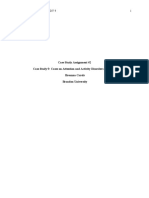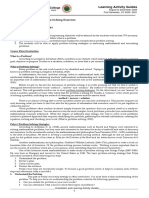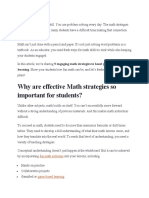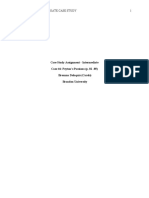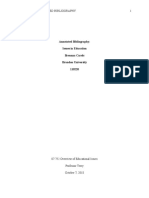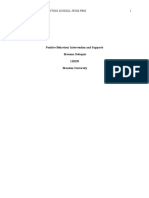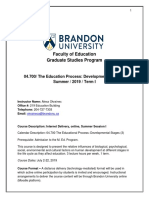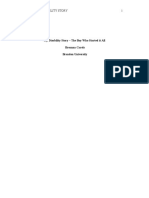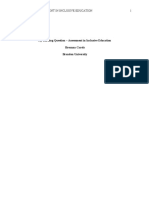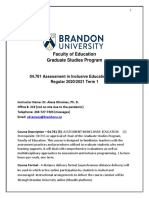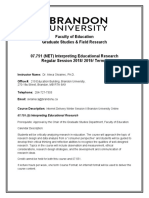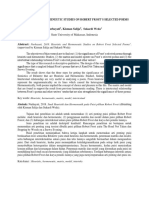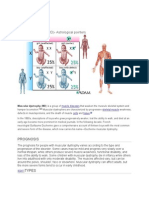Chapter 9 Assignment
Chapter 9 Assignment
Uploaded by
api-528144614Copyright:
Available Formats
Chapter 9 Assignment
Chapter 9 Assignment
Uploaded by
api-528144614Original Title
Copyright
Available Formats
Share this document
Did you find this document useful?
Is this content inappropriate?
Copyright:
Available Formats
Chapter 9 Assignment
Chapter 9 Assignment
Uploaded by
api-528144614Copyright:
Available Formats
Breanna Carels
110220
August 13, 2018
Chapter 9 - Math: Strategies and Techniques
Case 9.1 Rodney’s Mathematical Abilities
1. What do the examples of Rodney’s in-school and out-of-school
mathematics performance reveal about his mathematical strengths and
weaknesses?
Rodney works each week doing practice drills with his basic math facts and on average
has a 70% accuracy rate. This shows that he has a good understanding of basic math
facts in adding, subtracting, multiply, and dividing single digit numbers. He also
appears to have a strength in determination to complete tasks. He does not easily shut
down and continues to try to explain his thinking to his teacher. Another example of this
is at the laundromat he uses a trial and error basis to find the right change for the
machine. In terms of the laundromat, this does not benefit him as he could be losing
money every time, but overall his persistence to figure it out is a good attitude to have
when trying to solve math problems. Now with that being said, Rodney has several
weaknesses in his math abilities. It has been identified that he is at a 2.7 grade level for
basic math concepts, 2.1 for operations, and 1.7 for application. It is clear in the
examples provided that Rodney has difficulties with applying his knowledge of basic
math concepts into daily math problems. For instance in school, Rodney does addition
and subtraction with single digit numbers but has difficulty carrying that knowledge
through in doing larger addition or subtraction problems. He also has difficulty
explaining his process to identify his point of error. Outside of school, Rodney has
difficulty seeing the correspondence between adding on a worksheet and adding with
money and time.
2. What types of activities will help Rodney to think about why and how basic
math operations work?
First of all, when practicing math skills there should be a variety of ways in which you do
this. The textbook suggests that there should be a combination of games, drills,
practice, and opportunities to speak and write. It appears that the resource teacher is
already attempting to do this but should continue to allow Rodney these opportunities.
It is apparent that Rodney has difficulty applying his skills to different types of problems.
Therefore, it will also be important for his teachers to consistently give him real life
examples and reasons for how we would use these skills in our daily life (ie. dividing a
pie, picking up the laundry at the correct time, using correct change). Rodney will
benefit also from intensive instruction on the foundational outcomes. This year in my
grade nine math program I was part of an MRLC project. This project highlighted for us,
which were the foundational outcomes in our curriculum. Then from there we spent the
first several months of the year focusing strictly on foundational outcomes. The reason
we did this was that students required skills in these foundational outcomes in order to
complete and understand any new math concept introduced later in the year. There
was certainly a lot of benefit to teaching in this way and I will be continuing with this
routine this upcoming school year. Therefore, for a student like Rodney it will be
essential to understand foundational outcomes before moving on too quickly. Another
thing that may be considered eventually for Rodney is memorization of some basic
facts. You would never want to start learning new basic facts by simply memorizing
because you need students to understand the concepts. Once Rodney has a
conceptual understanding then he may work on memorizing facts. By memorizing facts,
he may reduce computation errors, increase his speed in solving problems, and engage
more actively in problems. The last suggestion I would have for Rodney would be to
use manipulatives initially. There is no harm in using manipulatives to help you gain
that conceptual understanding. You can use manipulatives for adding, subtracting,
multiplying, and dividing. Using manipulatives might help Rodney to understand
concepts such as the associative property and commutative property.
3. Will Rodney be able to learn the types of mathematics other sixth graders
study if he is still working to master basic computation facts?
Certainly, there is no reason that Rodney cannot learn the types of mathematics that his
grade will be learning for the year. The teachers will have to recognize that Rodney has
some weaknesses and plan accordingly for him. They will have to be strategic in the
way that they introduce new concepts to him, and they will have to give him many
opportunities to practice these new skills. The teachers could find ways in which
Rodney can practice these math concepts outside of math class. He can have
designated tasks to complete in the classroom that help him practice his newly learned
skills. Having the opportunities to do the different types of math that his fellow
classmates are working on will also strengthen his conceptual understanding of basic
math skills. With adaptations, Rodney can certainly engage in the same activities and
solve similar problems to his classmates.
Reference
Boyle, J., & Scanlon, D. (2018). Methods and Strategies for teaching students with high
incidence disabilities, 2nd Edition. Chapter 9: Math: Strategies and Techniques. Toronto, ON:
Nelson Canada
You might also like
- Laboratory Exercise 3Document12 pagesLaboratory Exercise 3Fil Francis SalvadorNo ratings yet
- Math4 - Q2 - Mod1 - v2Document19 pagesMath4 - Q2 - Mod1 - v2gerlie maeNo ratings yet
- Part e - Planning CommentaryDocument8 pagesPart e - Planning Commentaryapi-462892684No ratings yet
- Case Study Assignment 2Document7 pagesCase Study Assignment 2api-528144614No ratings yet
- Oath of The VayuputrasDocument7 pagesOath of The Vayuputrasutsav_gupta6128% (18)
- Parables of JesusDocument126 pagesParables of Jesusgirmalem100% (1)
- Homework Help Grade 12 MathDocument6 pagesHomework Help Grade 12 Mathg3v3q3ng100% (1)
- Test Prep Math Book for CASAS Math GOALS 2 Level E-Forms 929M and 930MFrom EverandTest Prep Math Book for CASAS Math GOALS 2 Level E-Forms 929M and 930MNo ratings yet
- California Math Homework and Problem Solving Grade 6Document8 pagesCalifornia Math Homework and Problem Solving Grade 6sbzkljhjfNo ratings yet
- Year 5 Maths Homework FactorsDocument5 pagesYear 5 Maths Homework Factorsh47ws5eq100% (1)
- Test Prep Math Book for CASAS Math GOALS 2 Level D-Forms 927M and 928MFrom EverandTest Prep Math Book for CASAS Math GOALS 2 Level D-Forms 927M and 928MNo ratings yet
- 2nd Grade Math Homework HelpDocument8 pages2nd Grade Math Homework Helpafnadzztkqmfrt100% (1)
- Name: Date of Birth: Age: Grade Level: School: Program Duration: Schedule: Number of Hours (Sessions) : Program NumberDocument3 pagesName: Date of Birth: Age: Grade Level: School: Program Duration: Schedule: Number of Hours (Sessions) : Program NumberIrish Joy Gales GanzanNo ratings yet
- Word Problems Homework Year 2Document4 pagesWord Problems Homework Year 2usbxsqznd100% (1)
- Evaluate Homework and Practice Module 2 Lesson 1Document5 pagesEvaluate Homework and Practice Module 2 Lesson 1h680z3gv100% (1)
- Word Problems Homework Year 5Document9 pagesWord Problems Homework Year 5afmsfvosb100% (1)
- Homework For Year 2sDocument4 pagesHomework For Year 2safmtfqako100% (1)
- Number Bonds Homework Ks2Document8 pagesNumber Bonds Homework Ks2afnaejbzmabqew100% (1)
- Math Word Problems Grade 7 HomeworkDocument6 pagesMath Word Problems Grade 7 Homeworkafnojpjbodumqc100% (1)
- Test Prep Math Book for CASAS Math GOALS 2 Level C-Forms 925M and 926MFrom EverandTest Prep Math Book for CASAS Math GOALS 2 Level C-Forms 925M and 926MNo ratings yet
- Test Prep Math Book for CASAS Math GOALS 2 Level A-Forms 921M and 922MFrom EverandTest Prep Math Book for CASAS Math GOALS 2 Level A-Forms 921M and 922MNo ratings yet
- Report 3 C&D RyalDocument11 pagesReport 3 C&D RyalDana RyalNo ratings yet
- Importance of Homework in MathsDocument6 pagesImportance of Homework in Mathsers57e8s100% (1)
- Completion Report-Action Research On Schema-Based Instruction (New)Document23 pagesCompletion Report-Action Research On Schema-Based Instruction (New)Melenia CabatanNo ratings yet
- Evaluate Homework and Practice Personal Math TrainerDocument6 pagesEvaluate Homework and Practice Personal Math Trainerg3v2nc4k100% (1)
- Math Homework Help Pre AlgebraDocument9 pagesMath Homework Help Pre Algebraeylilermg100% (1)
- 4 Grade Math Homework HelpDocument7 pages4 Grade Math Homework Helpafnasuqlhjppjx100% (1)
- Report 3 C&D RyalDocument10 pagesReport 3 C&D RyalCody RyalNo ratings yet
- Why Is It Important To Do Math HomeworkDocument9 pagesWhy Is It Important To Do Math Homeworktzhiouhjf100% (1)
- Homework and Remembering Answer KeyDocument8 pagesHomework and Remembering Answer Keyafmsaoyvn100% (1)
- 8th Grade Math Homework HelpDocument7 pages8th Grade Math Homework Helpers8b13w100% (1)
- Scale Factor HomeworkDocument5 pagesScale Factor Homeworkafeupzvkx100% (1)
- M118 Module 2Document3 pagesM118 Module 2rizaldorubenjr.101No ratings yet
- Integration Homework HelpDocument4 pagesIntegration Homework Helpafnoddijfdheuj100% (1)
- Problem Solving ModuleDocument38 pagesProblem Solving Modulecatubigjamine0No ratings yet
- My Homework Lesson 2 Relate Division and SubtractionDocument6 pagesMy Homework Lesson 2 Relate Division and Subtractiong3z27mt5100% (1)
- Help With My Homework MathDocument7 pagesHelp With My Homework Mathacmsodjlf100% (1)
- Eled Assignment 4a 5a 6a Lesson PlanDocument9 pagesEled Assignment 4a 5a 6a Lesson Planapi-349680766No ratings yet
- Madonna B. Cabantac Beed 2F: Having A Positive Attitude by Motivating and Inspiring His/her StudentsDocument2 pagesMadonna B. Cabantac Beed 2F: Having A Positive Attitude by Motivating and Inspiring His/her StudentsJerico ManaloNo ratings yet
- Math InterventionDocument4 pagesMath Interventionapi-643157368No ratings yet
- Test Prep Math Book for CASAS Math GOALS 2 Level B-Forms 923M and 924MFrom EverandTest Prep Math Book for CASAS Math GOALS 2 Level B-Forms 923M and 924MNo ratings yet
- Division Homework Year 1Document5 pagesDivision Homework Year 1afetbsaez100% (1)
- Ncee Economics Mystery AssignmentDocument5 pagesNcee Economics Mystery Assignmentapi-246723395No ratings yet
- I Never Do My Math HomeworkDocument4 pagesI Never Do My Math Homeworkfmpdflwlf100% (1)
- Homework Help Grade 12Document8 pagesHomework Help Grade 12g3nrpxpz100% (1)
- Math Homework Worksheets First GradeDocument8 pagesMath Homework Worksheets First Gradeafmtmonfx100% (1)
- Basic Math Homework HelpDocument7 pagesBasic Math Homework Helpcff4ez15100% (1)
- Year 9 Maths CourseworkDocument5 pagesYear 9 Maths Courseworkafjyadcjesbdwl100% (2)
- The Proficiency Level of Solving Mathematical Problem of Grade 10 Students in Matutum View Baptist Academy IncDocument19 pagesThe Proficiency Level of Solving Mathematical Problem of Grade 10 Students in Matutum View Baptist Academy IncSpIdIcYNo ratings yet
- Technology Week 3Document4 pagesTechnology Week 3api-142898262No ratings yet
- Homework Help For 3rd Grade MathDocument4 pagesHomework Help For 3rd Grade Mathafodcrhoobdopj100% (1)
- Common Core Lesson 21 Homework AnswersDocument6 pagesCommon Core Lesson 21 Homework Answersafmohoedf100% (1)
- Factors Homework Year 5Document9 pagesFactors Homework Year 5zbedtlapd100% (1)
- Model Multiplication Homework 12.1Document8 pagesModel Multiplication Homework 12.1afetynbpy100% (1)
- Best Practices Challenges Encountered Ways Forward in The Schools Learning Recovery ProgramDocument29 pagesBest Practices Challenges Encountered Ways Forward in The Schools Learning Recovery ProgramLENY FRANCISCONo ratings yet
- Common Core Mathematics Curriculum Lesson 20 HomeworkDocument8 pagesCommon Core Mathematics Curriculum Lesson 20 Homeworkafmsubdww100% (1)
- Math Homework 1st GradeDocument4 pagesMath Homework 1st Gradebjgmbuhjf100% (1)
- Why Solving Problems Involving Fractions?Document2 pagesWhy Solving Problems Involving Fractions?Maam IsureñaNo ratings yet
- Burauen Community College: Learning Activity GuidesDocument8 pagesBurauen Community College: Learning Activity GuidesRutchelNo ratings yet
- Math Homework Grade 3Document8 pagesMath Homework Grade 3eltklmfng100% (1)
- Homework Variables WorksheetDocument8 pagesHomework Variables Worksheeth6878h1t100% (1)
- Numeracy For LacDocument12 pagesNumeracy For LacRom Flor Cobrado100% (1)
- Rethinking Math Learning: Teach Your Kids 1 Year of Mathematics in 3 MonthsFrom EverandRethinking Math Learning: Teach Your Kids 1 Year of Mathematics in 3 MonthsNo ratings yet
- Case StudyDocument5 pagesCase Studyapi-528144614No ratings yet
- Critical Reflection Part ADocument10 pagesCritical Reflection Part Aapi-528144614No ratings yet
- Communication As Key To Building Strong Family - Final PaperDocument11 pagesCommunication As Key To Building Strong Family - Final Paperapi-528144614No ratings yet
- Case Study Assignment - IntermediateDocument5 pagesCase Study Assignment - Intermediateapi-528144614No ratings yet
- Annotated Bibliography - Breanna CarelsDocument6 pagesAnnotated Bibliography - Breanna Carelsapi-528144614No ratings yet
- Marion Terry - Bu Grad Journal - 12 1 - Refereed 20 - Breanna Delaquis - Shortened - ReadyDocument3 pagesMarion Terry - Bu Grad Journal - 12 1 - Refereed 20 - Breanna Delaquis - Shortened - Readyapi-528144614No ratings yet
- Positive Behaviour Intervention and Supports - Final PaperDocument16 pagesPositive Behaviour Intervention and Supports - Final Paperapi-528144614No ratings yet
- Teacher Burnout Literature ReviewDocument9 pagesTeacher Burnout Literature Reviewapi-528144614No ratings yet
- Faculty of Education Graduate Studies Program: 04.700/ The Education Process: Developmental Stages Summer / 2019 / Term IDocument6 pagesFaculty of Education Graduate Studies Program: 04.700/ The Education Process: Developmental Stages Summer / 2019 / Term Iapi-528144614No ratings yet
- My Disability StoryDocument6 pagesMy Disability Storyapi-528144614No ratings yet
- Glossary AssignmentDocument15 pagesGlossary Assignmentapi-528144614No ratings yet
- Faculty of Education Graduate Studies Program: 07:780 (A10) Graduate Scholarly Writing Spring Session 2019 Term BDocument5 pagesFaculty of Education Graduate Studies Program: 07:780 (A10) Graduate Scholarly Writing Spring Session 2019 Term Bapi-528144614No ratings yet
- My Burning QuestionDocument5 pagesMy Burning Questionapi-528144614No ratings yet
- Faculty of Education Graduate Studies ProgramDocument4 pagesFaculty of Education Graduate Studies Programapi-528144614No ratings yet
- Terry - 07-752 - Fall 2018 - Unit Four - Final - Breanna Carels - Revisions For The JournalDocument11 pagesTerry - 07-752 - Fall 2018 - Unit Four - Final - Breanna Carels - Revisions For The Journalapi-528144614No ratings yet
- Final Paper - Embracing DiversityDocument16 pagesFinal Paper - Embracing Diversityapi-528144614No ratings yet
- Faculty of Education Graduate Studies ProgramDocument8 pagesFaculty of Education Graduate Studies Programapi-528144614No ratings yet
- Faculty of Education Graduate Studies Program: 04.761 Assessment in Inclusive Education (NET) Regular 2020/2021 Term 1Document11 pagesFaculty of Education Graduate Studies Program: 04.761 Assessment in Inclusive Education (NET) Regular 2020/2021 Term 1api-528144614No ratings yet
- Faculty of Education Graduate Studies ProgramDocument6 pagesFaculty of Education Graduate Studies Programapi-528144614No ratings yet
- Faculty of Education Graduate Studies ProgramDocument5 pagesFaculty of Education Graduate Studies Programapi-528144614No ratings yet
- Faculty of Education Graduate Studies ProgramDocument14 pagesFaculty of Education Graduate Studies Programapi-528144614No ratings yet
- Faculty of Education Graduate Studies & Field Research: Instructor Name: Office #Document6 pagesFaculty of Education Graduate Studies & Field Research: Instructor Name: Office #api-528144614No ratings yet
- Faculty of Education Graduate Studies ProgramDocument8 pagesFaculty of Education Graduate Studies Programapi-528144614No ratings yet
- Revised Order Teaching Exceptional Children II Winter 2020 6 2 3Document15 pagesRevised Order Teaching Exceptional Children II Winter 2020 6 2 3api-528144614No ratings yet
- 10 Plastic Waste Thematic ProjectDocument21 pages10 Plastic Waste Thematic ProjectSpam SpamNo ratings yet
- BESM Anime d20 House RulesDocument3 pagesBESM Anime d20 House RulesSamuel ZhuNo ratings yet
- ICSE SchoolsDocument3 pagesICSE SchoolsitsjuzmeksNo ratings yet
- ArtikellDocument9 pagesArtikellNurul MaulidaNo ratings yet
- Guidelines To Contents of A Research ProposalDocument3 pagesGuidelines To Contents of A Research ProposalElqabukhaemi DarwisNo ratings yet
- Performance Evaluation Appraisal IIDocument6 pagesPerformance Evaluation Appraisal IITanisha VarshneyNo ratings yet
- AlcrisDocument5 pagesAlcrisJaypee PalcisNo ratings yet
- The Effect of Work Involvement and Work Stress On Employee Performance: A Case Study of Forged Wheel Plant, IndiaDocument5 pagesThe Effect of Work Involvement and Work Stress On Employee Performance: A Case Study of Forged Wheel Plant, IndiaInternational Journal of Application or Innovation in Engineering & ManagementNo ratings yet
- Week 1: Basics of Research and StatisticsDocument4 pagesWeek 1: Basics of Research and StatisticsTanya AlkhaliqNo ratings yet
- N I N W: Week 7: The Safe House by Sandra Nicole RoldanDocument7 pagesN I N W: Week 7: The Safe House by Sandra Nicole RoldanZyra Mae PaguintoNo ratings yet
- In Ni Eo 14Document50 pagesIn Ni Eo 14Manu Porcar JarqueNo ratings yet
- Gender Inequality Essay Planning PEEDocument6 pagesGender Inequality Essay Planning PEELuchmee Devi GoorjhunNo ratings yet
- Lattice Energy The Born-Haber CycleDocument4 pagesLattice Energy The Born-Haber Cycleabdulqudus abdulakeemNo ratings yet
- Drugs MnemonicsDocument6 pagesDrugs MnemonicsDarrylJavier100% (1)
- AYO 2012 ExcerptsDocument16 pagesAYO 2012 ExcerptsDavid Alejandro Padilla GuerreroNo ratings yet
- Kalbelia Dance Rajasthan - Kalbelia Rajasthani Folk Dance KalbeliaDocument6 pagesKalbelia Dance Rajasthan - Kalbelia Rajasthani Folk Dance KalbeliarahulgabdaNo ratings yet
- Questions. 1. Scarcity: A. Exists... : Question: Microeconomics Multiple Choice Questions. Please Answer All TheDocument14 pagesQuestions. 1. Scarcity: A. Exists... : Question: Microeconomics Multiple Choice Questions. Please Answer All TheRubina Hannure67% (3)
- AvbookDocument227 pagesAvbooksaurnihaNo ratings yet
- Newsletter 23rdoct2022Document4 pagesNewsletter 23rdoct2022Ryan NSNo ratings yet
- Valuation Report Ryanair ShortDocument20 pagesValuation Report Ryanair ShortJohn Sebastian Gil (CO)No ratings yet
- Comparing and Contrasting The Impact Jerzy Grotowski, Vsevolod Meyerhold and Peter Brook Have Had On The Industry.Document4 pagesComparing and Contrasting The Impact Jerzy Grotowski, Vsevolod Meyerhold and Peter Brook Have Had On The Industry.LewisjactorNo ratings yet
- Hassles ScaleDocument2 pagesHassles ScaleSoraya Faridi RibesNo ratings yet
- Cystic Diseases of The KidneyDocument14 pagesCystic Diseases of The KidneyBarda GulanNo ratings yet
- Module 2 SociologyDocument4 pagesModule 2 SociologyLoverlyn LuNo ratings yet
- Muscular DystrophyDocument15 pagesMuscular Dystrophyrajeevsonali100% (1)
- Automatic Control Systems - B. C. Kuo and F. GolnaraghiDocument103 pagesAutomatic Control Systems - B. C. Kuo and F. GolnaraghiJavier Caltzontzi HernandezNo ratings yet
- What Is Dharma)Document13 pagesWhat Is Dharma)Spartan SinghNo ratings yet



